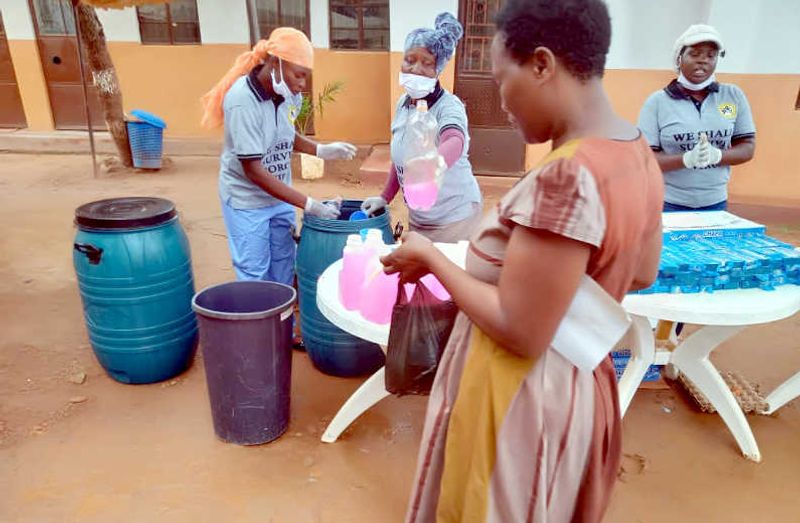

Workers of Hope of Hope of Children distributing liquid and bar washing soap to residents of Ndejje.
Hope of Children and Women Victims of Violence (HOCW), a community-based organisation located in Ndejje, that was founded and is run by a Congolese refugee, has become the source of hope and happiness for less privileged people in Ndejje, more so during this time of COVID-19 hardships.
At a time of serious financial strain made worse by the current COVID-19 lock-down measures introduced by the government that have paralyzed almost all small businesses in the towns that were the source of livelihood for most poor people, Hope of Children and Women has donated essential food and non-food items much to the excitement of the beneficiaries.

Residents smiled home with food, eggs, and other essential items distributed by HOCW
About 400 people were the lucky beneficiaries of this unusual gesture. Although majority are women refugees and victims of violence from neighbouring countries such as D.R. Congo, Sudan, Burundi and Rwanda, Ugandans were not turned away from the gifting bonanza.
With the help of the local chairman of Ndejje Central, a one Kulabako Mutebi Kassim and the Officer in Charge of Mirimu Police Post Julius Jokkende, HOCW leaders gave out essential items including eggs, beans, washing soap and maize flour to help them survive the current COVID-19 lockdown shortages.
Pr. John Bolingo Ntahira, the Founder and Executive Director of HOCW said the donation was made possible with financial assistance from the Republic of Slovenia through the Ministry of Foreign Affairs under supervision by the Equal Development Forum based in Slovenia.
In addition to the food and essential items, HOCW distributed flyers and stickers to the community to sensitize them about the Coronavirus and how to prevent its spread.
Since the first case of COVID-19 was reported in Uganda about 2 weeks ago, the number of people with the virus that kills its victims with severe flu-like symptoms has attacked 33 people.
Although none is yet to lose the battle to the disease, efforts to stem its spread have resulted into a nation-wide ban on social gatherings, movement of people resulting into widespread anxiety and a sense of hopelessness.
Uganda is not alone in imposing these widespread limitations. Reports indicate that the disease that has reached 192 countries out of the 195 members of the United Nations, have been affected.














Sunrise reporter
Leave a Comment
Your email address will not be published.